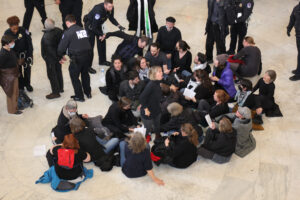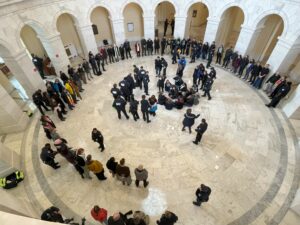
Tori Jones Long
Tori Jones Long reflects on why she participated in an act of civil disobedience that led to her arrest during the Jan 16 Mennonite Action demonstration for a ceasefire.
Tori Jones Long (she/her) is a local organizer for Mennonite Action in Bucks and Montgomery counties in Pennsylvania and is an active member of Salford Mennonite Church, Harleysville, Pa. Tori navigates life with her husband, Zach, and spends her time spoiling her two dogs, Frank and Eddie, and enjoying small-town life.
On Tuesday, Jan. 16, 2024, I was arrested with 134 other Mennonites by Capitol Hill Police for demonstrating inside the Canon House Office Building in Washington D.C. The group that was arrested inside the Canon House Building was supported by a group of 200 Mennonites and allies demonstrating outside. Many more were with us in spirit and virtually. Mennonite Action [an independent grassroots organization] organized our peaceful demonstrations, and hundreds of us travelled to Washington from across the United States. We were there calling for our elected officials to support a permanent ceasefire in Gaza, a release of all hostages and an end to the occupation of Palestine.
We made our voices heard in a quintessentially Mennonite way – through hymn singing. We gathered in the rotunda of the Cannon house building, unfurled banners that read, “Let Gaza Live,” “Free All Hostages,” “Mennonites for a Ceasefire” and “Send Food Not Bombs.” In the words of one participant, “we sang, and we sang, and we sang.”
Tori Jones Long (black-and-white checkered scarf) and others singing in peaceful protest in the Canon House Office Building rotunda. Video by Dave Kraybill.
The Capitol police were quick to snatch our banners and arrest our song leaders, wading into the center of our encircled bodies to grab them. They must have thought or hoped that without our initial song leaders, we would fall silent. But we sang, and we sang, and we sang.
New leaders would emerge as the group in the middle dwindled, but the design of the rotunda was to our advantage. Those who were already arrested wrapped around the perimeter and continued to carry the songs coming from the middle. Reverberating throughout the building was a unified voice, singing songs of lament, hope and liberation. The words echoed off the literal walls of power. Eventually, we were all arrested and put in zip-tie handcuffs, but still we sang, and we sang, and we sang.
We were split up and shuffled around the building in smaller arrest groups, and we sang, and we sang, and we sang.
We were invasively searched, had our belongings taken and were made to wait, and we sang, and we sang, and we sang.
My arrest group only stopped singing when we were loaded into transport vans and taken offsite for processing. Hymns and liberation songs rang through the halls of power for hours on Jan. 16, until every one of us was removed.

Provided by Mennonite Action
Why I participated
I had multiple motivations for participating in this act of civil disobedience. One significant motivation was the words of Seth Malone and Sarah Funkhouser, who are directing Mennonite Central Committee’s Palestine-Israel-Jordan program. Several weeks ago, they wrote, “We ask for your action in this moment. Do not let this government rest from your letters, calls and protests. We cannot be complicit nor complacent in this moment – now is the time to act.” Their words continue to ring in my ears.
I had been calling, emailing, faxing, posting online, signing petitions, donating money, demonstrating and organizing legislative visits for months. All I could show for that hard work were dissatisfying form responses from my elected officials.
Unsurprisingly, despite the pressure from so many, the United States continues to send billions of dollars in military aid to Israel and rejects any accountability measures to ensure that the money is used in accordance with human rights and U.S. laws. These are my tax dollars at work. The blank checks to Israel make Jewish, Israeli, Muslim and Arab peoples in the region and around the world less safe. More bombs and munitions are not the answer.
For me, civil disobedience seemed like the obvious next step and the least a self-identifying peacemaker could do.
To work for peace is at the core of who I am, particularly because I identify as a Mennonite. Jesus calls me to oppose oppression and violence, especially state-sanctioned violence. As the apostle John wrote, “to not love with words or tongue but with actions and in truth.”

Provided by Mennonite Action
I am grateful for the many ways that Mennonites pray with their feet and value community, mutual aid and service.
I am also deeply troubled. Christians have been largely silent the past few months and the ceasefire and Palestine solidarity actions of late are primarily led by Jewish, Muslim and Arab folks. Where are the Christians? To participate with Mennonite Action on Jan. 16 was to continue our long history of peacemaking in and solidarity with Palestine and to stand publicly stand against the rising tide of Christan Zionism and nationalism. I participated in the hope that other Christians would be inspired to act for peace.
I believe in a liberating Christ, who calls us very clearly to love our neighbor and to care for the orphan, widow and foreigner among us. For me, to be in alignment with my faith and the teachings of Jesus is to be brave and bold. It is to grieve and hope, to act in a way that honors the truth that all life is precious and that all people are made in the image of our loving creator. It is to dream of and usher in a new world, as we face the inhumanity of our current one. For these reasons and more, I was arrested on Jan. 16.
Read the related post, “Finding people who grieve the same way you do” here.

